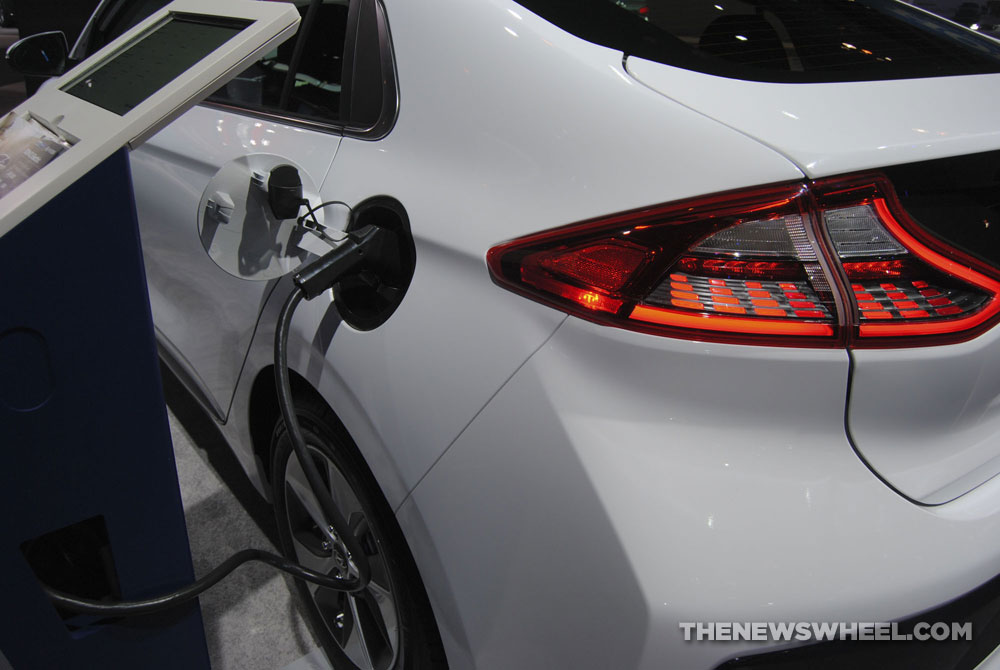 2018 Hyundai Ioniq Plug-in Electric sedan at the Chicago Auto Show
2018 Hyundai Ioniq Plug-in Electric sedan at the Chicago Auto Show
Photo: The News Wheel
Buying a used car is a great way to save money on your next vehicle purchase. And, those savings can compound when you buy an electric vehicle, which has limited maintenance needs and doesn’t require gasoline refuels (and, obviously, it’s good for the environment). But do the financial benefits of buying a used electric car outweigh the potential risks of driving an EV that’s multiple years old?
Have You Decided to Buy a Used Electric Vehicle?: Read these helpful tips for getting the best deal!
Purchasing a brand-new electric vehicle comes with a generous federal tax credit: up to $7,500 in credit for qualifying EV models and $3,750 for PHEVs! But, you’re not eligible for that cashback incentive if you purchase a used electric car that someone else already owned and received the tax credit on.
EVs depreciate in value very rapidly, so you’ll pay much less money to buy a pre-owned electric car that’s a few years old. According to iSeeCars, a new electric vehicle loses around 56 percent of its initial value in the first three years, which is a nearly 20 percent greater loss than the market average for all cars. On the flipside, if you buy a brand-new EV, it will drastically drop in value by the time you decide to sell it.
The more miles on a car’s odometer, the more maintenance it will require. A used EV’s parts — like brakes and tires — will have endured more wear and tear than a brand-new EV’s would have, so be prepared to pay for more upkeep costs on a pre-owned electric car. Luckily, EVs still require less maintenance than gas-powered cars that rely on mechanical systems to function.
The biggest maintenance cost on an electric vehicle is replacing the battery, which typically happens 8-10 years into its lifespan and costs $7,000-$25,000 depending on the model. Also, the battery’s performance slowly declines the older it is, meaning older batteries provide less range on a full charge. Keep those possibilities in mind when you decide how old of an EV you intend to buy and how long you keep it.
Like any vehicle purchase, a new EV carries more remaining warranty time than a pre-owned EV that’s halfway through its warranty period. If you want more comprehensive warranty coverage to last longer into your ownership, you’ll get more on a brand-new EV. And don’t forget that most automakers have a generous warranty covering EV battery failures.
Because a pre-owned EV will be a couple of years older than a brand-new one, the newer model will likely possess more, better features. If you want more bells and whistles, you’ll find the latest on a brand-new EV.
The younger an EV model is, the more bugs it is likely to have. Automakers continue refining their products with each ensuing model year. That’s why more recent EVs have improvements in battery capacity, range, and other such performance aspects over older models that were released closer to the initial nameplate launch.
When it comes to deciding between buying a used electric car or a brand-new one, you have to consider the mileage, condition, and value of the exact vehicle for sale. Do the math to help you decide what the best investment is.
Aaron is unashamed to be a native Clevelander and the proud driver of a Hyundai Veloster Turbo (which recently replaced his 1995 Saturn SC-2). He gleefully utilizes his background in theater, literature, and communication to dramatically recite his own articles to nearby youth. Mr. Widmar happily resides in Dayton, Ohio with his magnificent wife, Vicki, but is often on the road with her exploring new destinations. Aaron has high aspirations for his writing career but often gets distracted pondering the profound nature of the human condition and forgets what he was writing… See more articles by Aaron.



